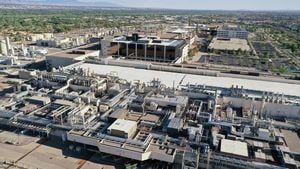Advancements in cellular mapping technologies are reshaping our comprehension of human biology and health. Recently, researchers have embarked on the ambitious task of generating comprehensive maps of the human body at the cellular level. This breakthrough is not just about cataloging cells; it’s about unlocking the mysteries of how our bodies function, how diseases develop, and how we might treat them more effectively.
One significant initiative, the Human Cell Atlas, aims to map the staggering 37.2 trillion cells comprising the human body. This endeavor is not only monumental due to the sheer number of cells but also due to the diversity of types and roles each cell plays. Understanding these variables can clarify how health issues, including cancer and degenerative diseases, manifest and progress. For example, Aviv Regev, co-chair of the Human Cell Atlas consortium, pointed out, "When things go wrong, they go wrong with our cells first and foremost," emphasizing the cells' central role in health and disease.
Researchers have turned their attention to specific organs and tissues to construct this atlas. Cells within the mouth, stomach, intestines, bones, and joints have been studied to determine their unique functions and interactions. By creating high-resolution, open-access maps, scientists hope to provide invaluable resources to help fight diseases, especially those tied to cellular dysfunctions.
The mapping project recently yielded encouraging results, with findings published in the journal Nature. This initial draft serves as the groundwork for more extensive explorations, set to progress with the future completion of the atlas by 2026. The final version will include detailed profiles on 18 organs and body systems, including the skin, heart, and breast tissues.
Dr. Timothy Chan, noted for his expertise at the Cleveland Clinic, remarked on the potential impact of this cellular mapping. He stated, "Different types of cells have different Achilles' heels," indicating this research could be pivotal for cancer research and treatment strategies. By pinpointing the functions and vulnerabilities of various cell types, researchers can develop targeted therapies — ideally offering more effective treatments with fewer side effects than traditional approaches.
A diverse range of related projects also complements this initiative. Various atlases are being developed to examine specific bodily functions and health conditions. For example, brain atlases aim to dissect the complex architecture and functions of different brain cells, which could lead to innovative treatments for neurological conditions. Similarly, new microbiome atlases are being devised to explore the rich collection of microorganisms residing within the gut—integral to digestion and immune function.
One recent highlight of this momentum is the creation of the first complete map of human skeletal formation, shedding light on significant health issues like arthritis and congenital conditions. This map provides insights not just on how bones form but also on the genetic links influencing conditions like arthritis. The research team at the Wellcome Sanger Institute utilized cutting-edge genomic techniques to assess early skeletal development, part of the broader Human Cell Atlas project.
This skeletal atlas serves as more than just a research tool; it has practical applications. By detailing the cells involved early on, the study opens up potential pathways for diagnostics and treatments aimed at conditions such as craniosynostosis, where skull bones fuse prematurely, preventing healthy brain development. Such insights could lead to timely interventions improving the quality of life for affected children.
Through highly sophisticated technologies, the researchers were able to observe cell behavior and interactions during the early stages of bone and cartilage development. They mapped the genes activated within these cells, correlates to adult diseases like hip and knee arthritis. This granularity of data is invaluable, laying the groundwork for future therapeutic innovations.
Dr. Ken To from the Wellcome Sanger Institute articulated the extensive potential of their findings, stating, "Our research has characterized cell types and mechanisms involved in forming bone and fusing skulls". This foundational work not only enhances our current knowledge but also drives future research on conditions affecting both young and older populations.
Research informs the decision-making process on the use of therapeutics during pregnancy as well. With current knowledge indicating certain drugs may disrupt healthy skeletal development, insights from research will push for informed scrutiny of medications prescribed to pregnant individuals.
Professor Sarah Teichmann, also from the Wellcome Sanger Institute and deep-rooted within the Human Cell Atlas initiative, praised the collaborative nature of this work, emphasizing how such detailed atlases can propel the wider research community toward groundbreaking discoveries. The resources generated through this collaboration can aid scientists globally, marking significant strides toward comprehending complex human development and health.
These advancements don’t just illuminate the pathways of bone formation and skeletal health; they also point toward comprehensive strategies for managing arthritis — the most prevalent form of arthritis causing painful degradation of the hip and knee joints. Understanding how genetic variants influence these conditions frames new approaches to treatment and prevention.
The collective energies of multiple research teams are pushing the boundaries of biomedical science, through cellular maps capable of detailing the inner workings of human health at unprecedented levels. A concerted future effort is necessary as researchers collectively work toward unraveling the intricacies of our biology. By fostering advancements like the Human Cell Atlas, we inch closer to fully mapping the blueprint of human health, one cell at a time, eventually transforming our approach to disease and therapy for generations to come.



